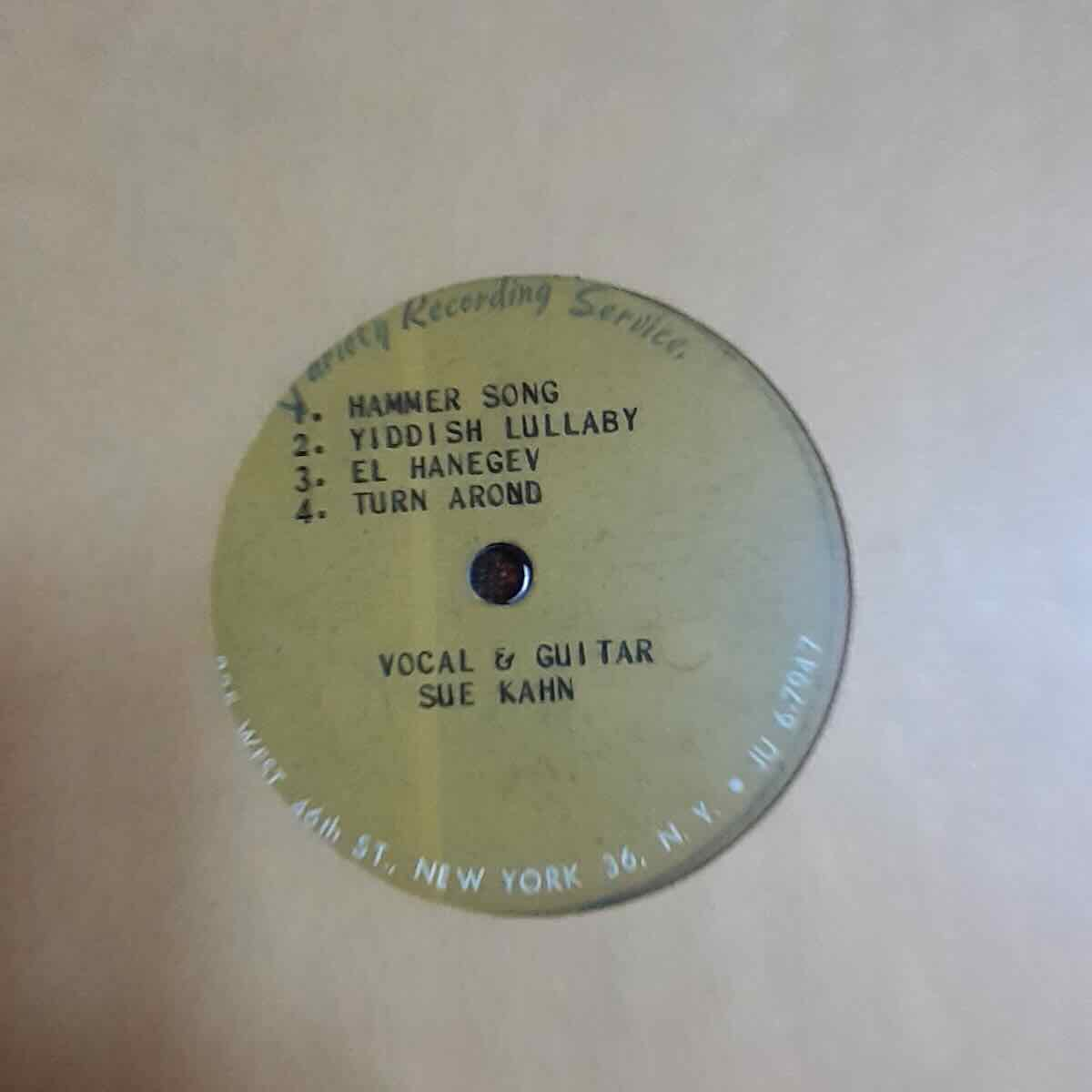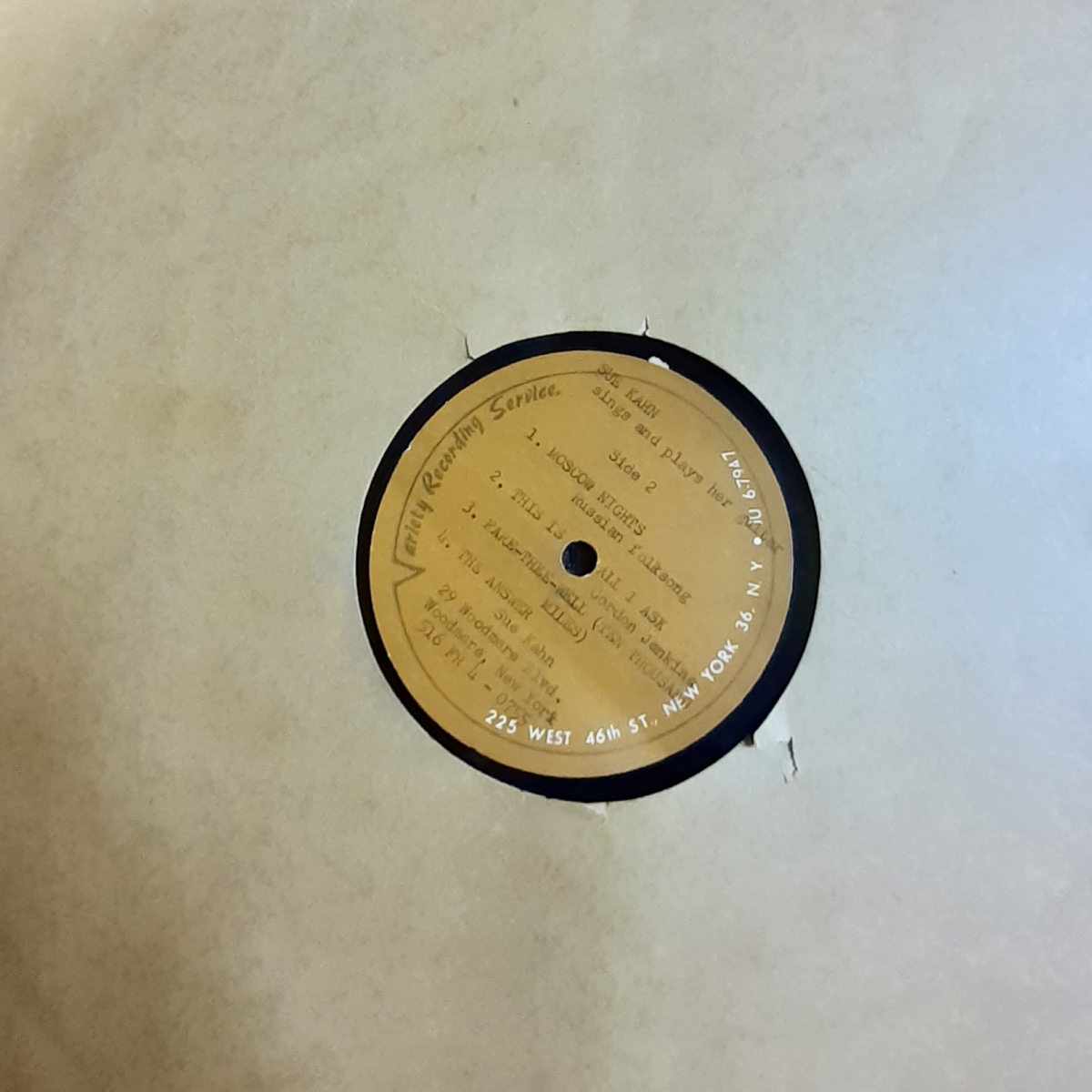
A Quest For A Face.
1963 was a good year for New York folkie Sue Kahn. The recent graduate from New York College of Music was performing in the coffee houses of the Big Apple, having also secured the prestigious gig of a resident folk singer at Grossinger's, the Jewish holiday complex in the Catskills. A radio interview she undertook that summer with Al Wasser on Radio New York Folk Music Worldwide survives. It reveals a young woman brimming with ideas and passion. In it, she talks about her album appearing the following year, her influences, and her plans regarding a music career.
Resident at 29 Woodmere Boulevard, Woodmere, a building that still stands, Sue Kahn was going places, but quite where we no longer know. The anticipated album failed to appear, evidence of her career exists solely in that radio interview, and no photograph puts a face to her brief ambitions. Still, there is the beguiling existence of seventeen recorded songs. These stretch across three acetate discs, two 12 and one 10-inch.
They appeared on eBay about a decade ago, each listed individually at an opening bid of $2.99, stating simply Sue Kahn. Folk Singer. Acetate. Curious, I googled her, discovering zilch. Placing three $20 tries, I was surprised to find an invoice for $8.97, the postage to the UK dwarfing their lowly purchase cost. When played, there emerged a trained, pure voice with guitar, her vocals occasionally a little too neat for the folk genre, but the songs have a distinctive professionalism, a period charm, her guitar playing is pretty nifty, too.
There's a Russian folk song, Jewish and Haitian ones, American and English too, as well as covers of Tom Paxton's "Ramblin' Boy," Sydney Carter's "Crow On The Cradle," and Gordon Jenkin's "This Is All I Ask." Kahn obviously knew her songbooks. Labels on the discs, where such remain, the state simply Sue Kahn sings and plays her guitar. The acetates, cut at Variety Recording Service, 225 West 46th Street' are housed in buff-colored sleeves within a torn brown paper envelope, "Sue Kahn - Acetates" scribbled neatly in pencil on the front.
Having had them digitized, I've grown in the intervening decade to admire the unique talent of Sue Kahn, as have a few friends. She has the air of a young Joan Baez, but apart from the radio interview lurking in the corners of the internet, years of searches for a photograph, or even a trace of her, have proven fruitless. She'd have had posters or flyers for her Grossinger's and coffee house sojourns, but such ephemera doesn't always survive.

My hunch is that the acetates are those played on the radio show and were her personal and sole copies. Acetates were expensive in both dollars and time, and these may have come on the market after her demise. If she were alive, she'd be in her eighties. Did she willingly disappear circa 1964, in the fashion of Connie Converse and Jim Sullivan, if indeed any willingness can be attached to their absences? Perhaps she simply met a nice Jewish boy and got married? Maybe she died in a car crash? Such are the conjectures that arise when nothing yet remains.
Her songs could make a delicious double vinyl album, a wonderful postcard from the past at the beginning of the folk explosion. Without a face to adorn one, such a project would be pointless—a failure by design. Someone must recall seeing her perform, and somewhere in a closet, an abandoned filing cabinet, something will reside of Sue Kahn. A fading polaroid of her singing from a holiday at Grossinger's would suffice. A mention or a memory, a description of her face, so her songs from sixty years ago can finally entertain and grace the wider world.
Sue Kahn
Hi Lee, Wonderful to learn a little more of Sue and that she made it into the seventies, though, even there, she remains a distant mystery. Any scrap of information will be gratefully added to the little that I know. Thanks for taking the time to respond. That has rather brightened my dull, cold and grey Manchester afternoon. Best Wishes and fondest regards. Rob Cochrane.

As 2024 is coming to an end. My brother and myself had a conversation about Sue Kahn Cooper.
We pick up your story about a decade later when my brother Mitchell armed with an acoustic guitar on Hudson Avenue in Cedarhurst was in search for a guitar teacher.
Our mother found Sue through most likely the pennysaver and for a few years my brother learned to play songs like garden party, Henry the VIII, and a slew of folk songs. I have to think the Cooper part was she married. Sue was a staple I'm our house weekly to learn the songs she stapled into a spiral notebook. As the songbook filled with hits, my brother wanted to move on to electric guitar...in came the fender stratacaster and out went Sue...my memories of her were the boho style pants, sandals and a love for music. Your post brought new questions to a closed song book of about 50 yesrs ago.